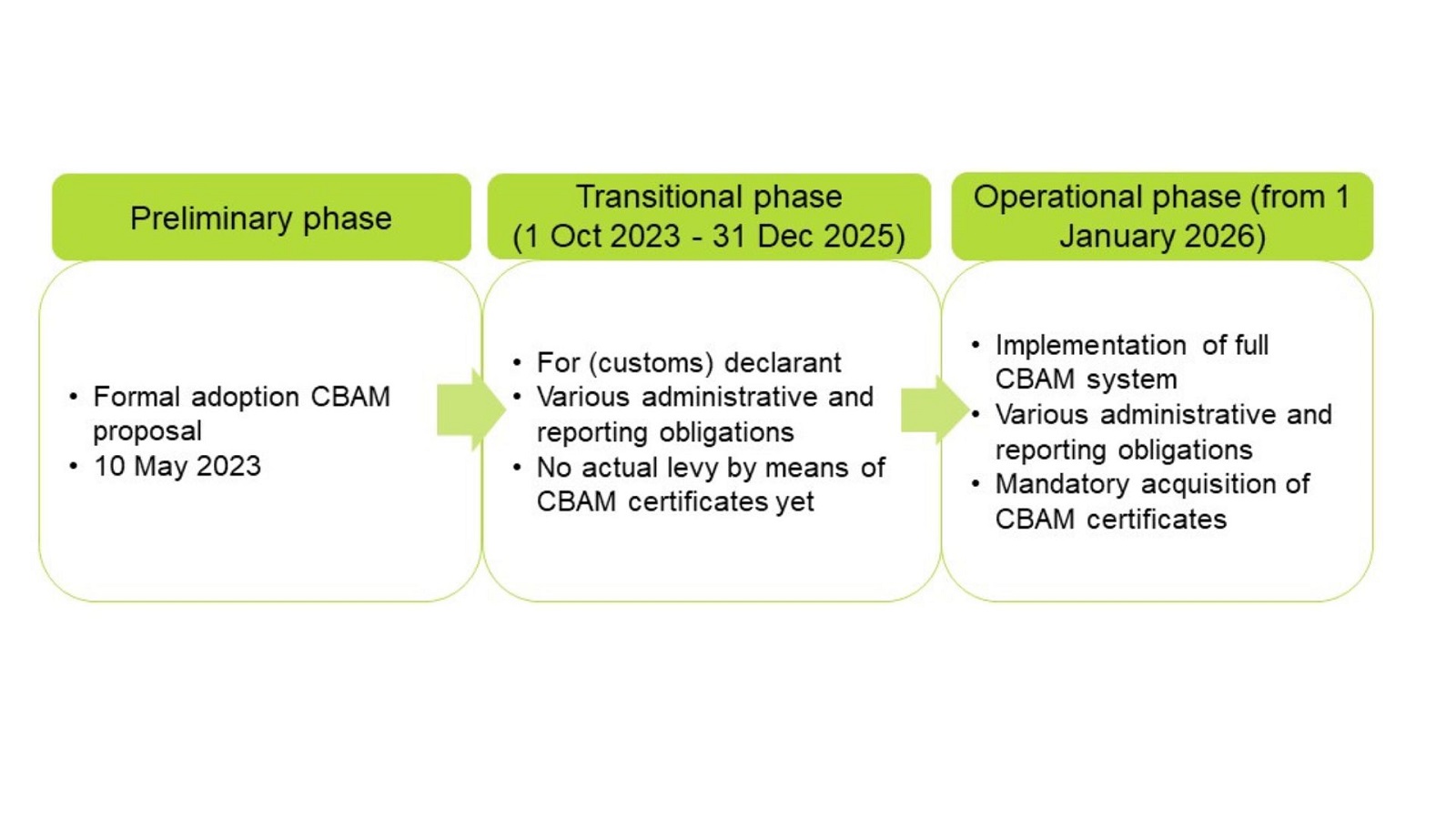The CBAM (Carbon Border Adjustment Mechanism) will come into effect on 1 October 2023. This regulation is part of the European Union’s so-called ‘Green Deal’ and is intended to offset greenhouse gases emitted during the production of designated goods outside the EU.
We reported previously about the CBAM and described the outline of the new border levy, as well as a number of amendments in the final version. In this article we will discuss the transitional phase for the CBAM, which will run from 1 October 2023 to 31 December 2025. We will also update you on the most recent developments including the unveiling of draft implementing regulations for reporting obligations under CBAM during the transitional period starting on 1 October 2023.
CBAM outlined
The European regulations for the CBAM are related to the EU Emissions Trading System (ETS). This system requires entrepreneurs operating in certain polluting sectors – for example, the steel and fertiliser industries – to purchase emission certificates depending on their greenhouse gas emissions. There are concerns that companies will move their production to non-EU countries as a result of the ETS. This is also known as ‘carbon leakage’.
The CBAM aims to combat carbon leakage by imposing levies on the import of emission-intensive products from outside the EU. From 2026 onwards importers will be obligated to purchase certificates (or have them purchased) if they import goods that fall under the scope of the CBAM into the EU. This concerns certain products in the cement, electricity, steel and iron, fertiliser and aluminium industries.
The transitional period (1 October 2023 to 31 December 2025)
The European legislator is aware that implementing the CBAM will have major financial and practical implications for the business community, which is why the CBAM includes a transitional scheme. Essentially, this scheme means that entrepreneurs will not be obligated to buy certificates during the transitional period. They will, however, be subject to various administrative requirements. During the transitional phase, the CBAM will in fact be a ‘paper’ exercise without levies.
The original CBAM proposal stated that the transitional period would come into effect on 1 January 2023. This deadline was exceeded. The regulation now provides for a transitional period that will run from 1 October 2023 to 31 December 2025. During this first phase of the CBAM, the following obligations (among others) will apply:
Customs declarants that import goods within the scope of the CBAM during the transition period will have special reporting obligations. Every quarter they will have to submit a CBAM report to the competent customs authorities within one month after the end of the quarter.
The CBAM report includes information on the total volume of the goods, the actual total embedded emissions and any carbon levies paid in the country of origin. The European Commission may take further measures regarding the information to be reported and the methods used to calculate embedded emissions.
Upon failure to comply with the reporting obligation, the competent customs authority will apply a sanction (penalty). The sanction must be ‘proportionate and dissuasive’ to ensure compliance with the obligations.
During the transitional period CBAM declarants, foreign producers, importers and CBAM verifiers, as well as the competent customs and other authorities, should prepare for the intended introduction of the levy system on 1 January 2026.
In short, the expected timeline is as follows:

CBAM Implementing Regulation
On June 13 2023 the EU Commission published the draft version of the CBAM Implementing Regulation. This Implementing Regulation includes provisions relating to several matters, including:
The data to be collected and reported during the transitional period;
The calculation of embedded emissions;
Penalties for non-compliance;
Systems to file and manage the CBAM declarations; and
The use of default values.
The draft version of the CBAM Implementing Regulation is open for public consultation until July 11 2023 after which it is likely to be finalised and adopted.
Are you operating in emission-intensive industries? Time to prepare your business!
Representatives of the European Council and the European Parliament signed off on the proposal (with a number of changes) on 10 May 2023. Given the fact that the transition scheme is due to come into effect in a few months, it is important to start preparing now. This is not only the case for the sectors subject to the CBAM under the regulation (cement, steel and iron, electricity, fertilisers and aluminium). The European Commission has stated its intention to steadily extend the scope of the CBAM to other emission-intensive sectors such as the hydrogen sector, the paper and pulp industry and the ceramics industry. By preparing in good time you can avoid having to act hastily to comply with the requirements should the scope of the CBAM be extended.
We expect that the calculation obligation in particular will present the most challenges. After all, the starting point is that the number of CBAM certificates to be purchased will depend on the actual emissions in the (non-EU) country of production and origin. The calculation methods that must be used are complex and require in-depth knowledge of the production processes of the goods in question. Many businesses will have to invest a great deal to comply with the calculation obligation.
Do you have questions about the CBAM, international trade in goods and sustainability? We’re here to help!
It is clear that the CBAM will make its mark on international trade. Should you wish to discuss the consequences for your business, please contact Marisa Hut or Stevie Mols at VAT & Customs Advisory.
Additionally, Baker Tilly can you map the impact of the Green Deal on your business and determine how you can prepare in time.
Want to know more about sustainability and ESG? Our colleague Lucy Lau at ESG Advisory would be happy to discuss the specific opportunities and challenges that these topics have for your business.
The legislation and regulations in this area may be subject to change. We recommend that you discuss the potential impact of this with your Baker Tilly advisor.
Other insights
-
‘VAT in the Digital Age’: the new ViDA rules are coming!
-
EU Deforestation Regulation (EUDR): stringent rules for importers, operators and traders
-
Customs Talks: How the new EU Deforestation Regulation (EUDR) will impact business with the UK





